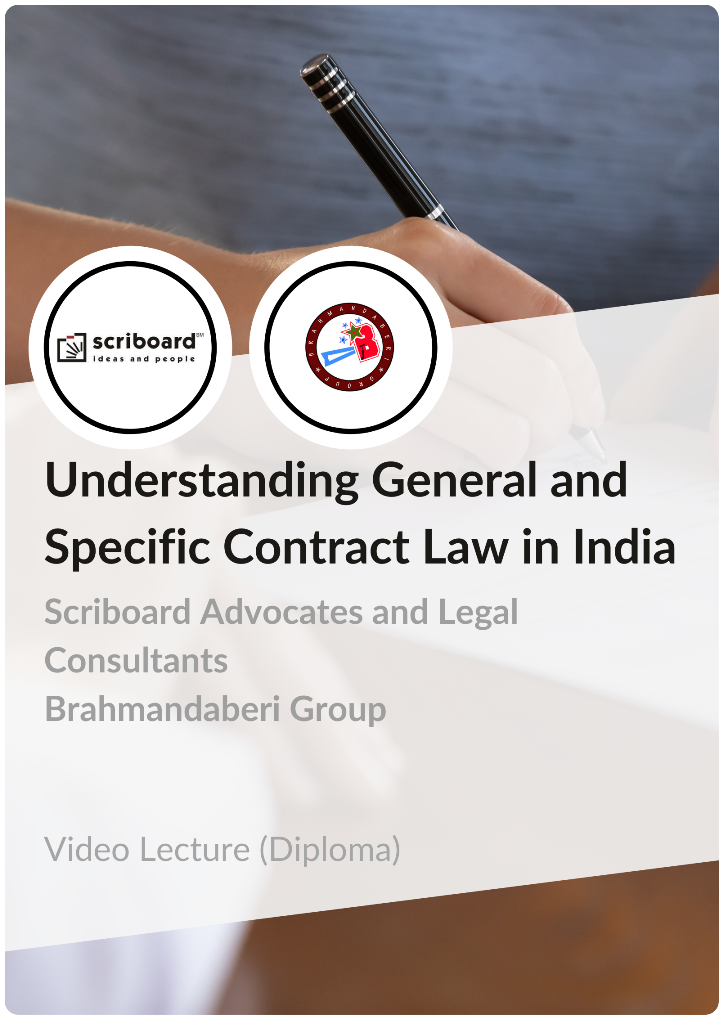Enrol for Lifetime Deal Course and get Access to 100+ Certificate Courses at INR 5999
Enrol for a Master Course at INR 3999 and get access to multiple Certificate Courses
Enrol for a Diploma Course at INR 2999 and get two free Certificate Courses
Enrol for a Certificate Course at INR 1999 and get one free Certificate Course

₹9,998.00 Original price was: ₹9,998.00.₹9,998.00Current price is: ₹9,998.00.
The law of contracts’ development can be seen as spanning several centuries, evolving constantly to keep pace with the economic, political and technological changes that have occurred over the course of time. In India, the law pertaining to contracts is to be found in the Indian Contract Act 1872. The object of the Contract law is to ensure that the rights and obligations arising out of a contract are honoured and that legal remedies are made available to an aggrieved party against the party failing to honour his part of agreement. Sections 1-75 of the Indian Contract Act 1872 deal with the general principles of contracts- which are applicable to all types of contracts. Furthermore, Chapter VIII to X deal with specific contracts, along with the Sale of Goods Act, 1930, the Partnership Act, 1932 and the Negotiable Instruments Act of 1881.
The Diploma in Understanding General and Specific Contract Law in India is brought to you by Brahmandaberi Group and Scriboard Advocates and Legal Consultants in association with Enhelion. It provides a general overview of the provisions of the Indian Contract Act, Sale of Goods Act, 1930, Partnership Act, 1932 and Negotiable Instruments Act of 1881, by means of video lectures.
According to our policy, the course fee will not be refunded.
WHAT WILL SET YOU APART?
Enrolling for the certificate programme will enable you to:
The curriculum has been designed to provide a basic understanding of the general principles of contract in India vis-à-vis Indian Contract Act, 1872 as well as the provisions dealing with specific contracts like the contract of guarantee, bailment, pledge, agency, partnership, sale of goods and negotiable instruments.
The following modules are covered under the course [Video lectures only]–

1. Karthik Brahmandaberi
Karthik Brahmandaberi graduated in law in from Osmania University, Hyderabad and completed his MBA from City University of Seattle, Switzerland. He has been practicing law since for more than a decade. He through his law firm Brahmandaberi Group [a leading law firm in Hyderabad] provides all types of legal services including but not limited to drafting agreements, contracts, rental agreements or any other contractual documentations, contractual or any other commercial, legal statutory documentation and to act as advisers and consultants on all legal matters to any business entities either Private Limited, Public Limited, Government companies, proprietary concerns, partnership firms or any other legal entities in India or abroad. It also provides arbitration services for rendering disputes between two or more parties including individuals, companies, proprietors, associates, unions or any other form of legal entities.
2. Rodney D Ryder
Rodney D. Ryder is the founding partner at Scriboard and is a leading technology, intellectual property and corporate lawyer. He is the author of Guide to Cyber Laws: the Information Technology Act, 2000, E-Commerce, Data Protection and the Internet, the first section-wise analysis of the Indian Information Technology Act, 2000. He is presently Advisor to the Ministry of Communications and Information Technology, Government of India on the implementation of the Information Technology Act, 2000.Mr. Ryder has been nominated as a 'Leading Lawyer' in intellectual property, technology, communications and media law by Asia Law, Who'sWhoLegal, Asia Legal 500, amongst other International publications. Mr. Ryder is also advisor to the Data Security Council of India [a NASSCOM initiative] on the structuring of industry data privacy and information security policies and contractual standards. His second book, Intellectual Property and the Internet, published by LexisNexis is perhaps the only one of its kind in Asia. The text has been acknowledged to be an authoritative work by the Hon’ble Supreme Court of India and has been quoted in the first and only judgement by the Hon’ble Supreme Court of India on domain names. He is advisor to the National Internet Exchange of India [NiXI] and a member of the panel of independent and neutral arbitrators with NiXI.
In every walk of life, the process of evaluation takes place in one form or the other. If the evaluation process is eliminated from human life then perhaps the aim of life may be lost. Being in the same line, Enhelion is committed to evaluating the process of learning through its courses.
The enrollee will be evaluated based on two Project Assignments, which would test the analytical understanding of the topics covered in the video lecture.
The most intriguing aspect of the evaluation process is the time flexibility it affords. You can choose to undergo the evaluation process as and when you are ready for the same.
To be eligible to receive a certificate after successful completion of the course, one is required to secure an overall minimum of 40 percent in the Project Assignments.
